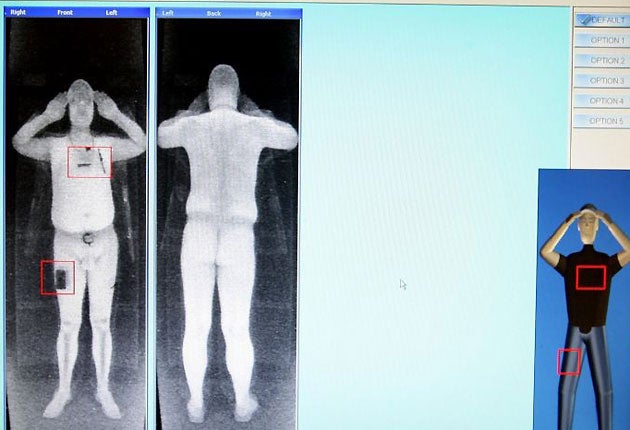'Naked view' scanner goes on airport trial

Your support helps us to tell the story
From reproductive rights to climate change to Big Tech, The Independent is on the ground when the story is developing. Whether it's investigating the financials of Elon Musk's pro-Trump PAC or producing our latest documentary, 'The A Word', which shines a light on the American women fighting for reproductive rights, we know how important it is to parse out the facts from the messaging.
At such a critical moment in US history, we need reporters on the ground. Your donation allows us to keep sending journalists to speak to both sides of the story.
The Independent is trusted by Americans across the entire political spectrum. And unlike many other quality news outlets, we choose not to lock Americans out of our reporting and analysis with paywalls. We believe quality journalism should be available to everyone, paid for by those who can afford it.
Your support makes all the difference.An X-ray machine that produces "naked" images of passengers was introduced at an airport today, enabling staff to instantly spot any hidden weapons or explosives.
The full body scanner, being trialled at Manchester Airport, will also show up any breast enlargements, false limbs, piercings, and a clear outline of passengers' private parts.
Some travellers might not want to be scanned because of the graphic nature of the images, bosses admit.
They can refuse to undergo the virtual strip search at Terminal 2, opting for the traditional "pat down" search instead.
But the black and white image will only be seen by one officer in a remote location before it is deleted, Sarah Barrett, head of customer experience at the airport, said.
"Most of our customers do not like the traditional "pat down" search, they find it too intrusive, but they still want to be kept safe.
"This scanner completely takes away the hassle of needing to undress. The images are not erotic or pornographic and they cannot be stored or captured in anyway," she said.
The scanner, made by the firm RapiScan Systems, makes the check-in process much quicker for passengers, who will not have to remove their coats, shoes or belts.
Frequent flyers do not need to worry about radiation from the low-level X-ray, she said, and a dental X-ray transmits 20,000 times more radiation.
"Passengers can go through this machine 5,000 times a year each without worrying, it is super safe and the amount of radiation transmitted is tiny," Ms Barrett said.
The scanners, which cost £80,000 each, were also trialled at Heathrow Airport in 2004. The Department for Transport will decide whether to install them permanently at the end of the trial, which is expected to last for a year.
Electromagnetic waves are beamed on to passengers while they stand in a booth, and a virtual three-dimensional "naked" image is created from the reflected energy.
Security officials in the United States have pioneered their use at New York and Los Angeles airports, and they are gradually being rolled out in other airports in the country.
Join our commenting forum
Join thought-provoking conversations, follow other Independent readers and see their replies
Comments